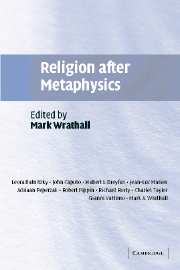Book contents
- Frontmatter
- Contents
- List of contributors
- Preface
- 1 Introduction: metaphysics and onto-theology
- 2 Love and death in Nietzsche
- 3 After onto-theology: philosophy between science and religion
- 4 Anti-clericalism and atheism
- 5 Closed world structures
- 6 Between the earth and the sky: Heidegger on life after the death of God
- 7 Christianity without onto-theology: Kierkegaard's account of the self's movement from despair to bliss
- 8 Religion after onto-theology?
- 9 The experience of God and the axiology of the impossible
- 10 Jewish philosophy after metaphysics
- 11 The “end of metaphysics” as a possibility
- Index
10 - Jewish philosophy after metaphysics
Published online by Cambridge University Press: 21 May 2010
- Frontmatter
- Contents
- List of contributors
- Preface
- 1 Introduction: metaphysics and onto-theology
- 2 Love and death in Nietzsche
- 3 After onto-theology: philosophy between science and religion
- 4 Anti-clericalism and atheism
- 5 Closed world structures
- 6 Between the earth and the sky: Heidegger on life after the death of God
- 7 Christianity without onto-theology: Kierkegaard's account of the self's movement from despair to bliss
- 8 Religion after onto-theology?
- 9 The experience of God and the axiology of the impossible
- 10 Jewish philosophy after metaphysics
- 11 The “end of metaphysics” as a possibility
- Index
Summary
The intellectual biographies of Emmanuel Levinas and Leo Strauss are remarkably similar. Both are post-Holocaust thinkers attempting to rethink the philosophical possibility of morality after the Nazi genocide and they use many of the same philosophical resources to do so. Both studied with Husserl and Heidegger in the 1920s, both claim a methodological return to Husserl in arguing against what each maintains is the amorality of Heidegger's philosophy, and both claim Franz Rosenzweig as a, if not the, major influence in so doing. The exegesis of classic Jewish texts matters greatly to both of them, and each claims to be returning to Plato. Both have had significant Catholic receptions and both continue to have important influences on contemporary discussions of ethics and politics. Nevertheless, despite these striking historical similarities, from the perspective of their philosophies themselves, one might think that Levinas and Strauss do not have much in common philosophically with one another. And if one made this claim, it would be based largely on yet another remarkable similarity between Levinas and Strauss, which is their respective constructions of the relation between what Levinas calls “Greek” and “Hebrew” and what Strauss calls “Athens” and “Jerusalem.”
As has been argued by a number of recent interpreters, the crux of Levinas's philosophy is his reorientation of “Greek” by way of “Hebrew.” In this light, Levinas is thought to be a Jewish philosopher whose achievement is to have revived the Jewish tradition philosophically.
- Type
- Chapter
- Information
- Religion after Metaphysics , pp. 146 - 165Publisher: Cambridge University PressPrint publication year: 2003



